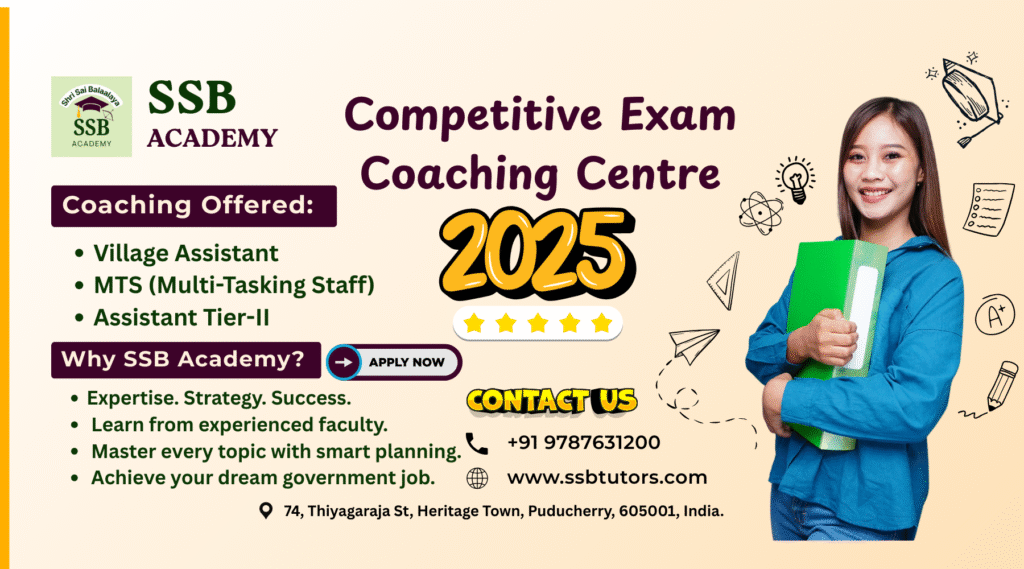The Complete Guide to Exam Preparation: CAT, GATE, Bank, UPSC & Government Exams

Preparing for competitive exams is not just about studying books—it’s about aligning your time, energy, and strategy toward a clear goal. Whether you aim to crack CAT, GATE, Bank exams, UPSC, or other Government exams, this guide will help you understand the eligibility, preparation strategies, exam patterns, and resources to get ahead of the competition.
At SSB Academy, we believe in smart, targeted preparation. We’ve mentored thousands of aspirants over the years—and the one thing we’ve seen that works every time is a well-structured study plan rooted in deep understanding, regular practice, and expert feedback.

Why Exam Preparation Is a Career Investment
Competitive exams open doors to prestigious careers in administration, engineering, banking, research, and public service. Acing them leads to high-paying, stable, and socially respected jobs.
Yet, lakhs of candidates apply every year for a limited number of seats. So, structured exam preparation isn’t optional—it’s essential. Understanding who is eligible, how to apply, and how to prepare is the first step toward success.
1. CAT Exam Preparation – Gateway to IIMs and Top B-Schools
What Is CAT?
The Common Admission Test (CAT) is conducted by the IIMs on a rotational basis. It is the primary entrance test for MBA/PGDM programs in IIMs and other top B-schools like SPJIMR, MDI, FMS, and more.
Eligibility Criteria
A bachelor’s degree with at least 50% marks (45% for SC/ST/PwD) from a recognized university.
Final-year graduation students are also eligible.
No age limit or limit on the number of attempts.
Exam Pattern
Three sections: VARC, DILR, QA
Duration: 2 hours (40 minutes per section)
Both MCQ and non-MCQ questions
Pro Tips for Preparation
Focus on time-based mock tests every weekend.
Use apps like Word Power Made Easy for vocabulary and Arun Sharma books for Quant.
Learn to eliminate wrong options quickly in VARC and DILR.
Visit official site: https://iimcat.ac.in

2. GATE Exam Preparation – Higher Studies and PSUs
What Is GATE?
The Graduate Aptitude Test in Engineering (GATE) is jointly conducted by IITs and IISc. It assesses understanding in undergraduate engineering subjects and is used for M.Tech/M.E admissions and PSU recruitment.
Eligibility Criteria
Bachelor’s degree in Engineering/Technology/Architecture.
Final-year students are also eligible.
No age limit.
Exam Pattern
Duration: 3 hours
Total Marks: 100
Sections: General Aptitude (15 marks), Engineering Mathematics, Core subject
Smart Preparation Tips
Focus on solving previous 10-year papers.
Use standard books (e.g., Signals & Systems by Oppenheim for ECE).
Join test series by platforms like Made Easy or GateForum.
Official site: https://gate.iitkgp.ac.in
3. Bank Exam Preparation – For IBPS, SBI, and RBI
Why Bank Exams?
Banking exams are your gateway to becoming a Probationary Officer (PO), Clerk, or Specialist Officer in India’s public sector banks.
Eligibility Criteria
Bachelor’s degree in any discipline from a recognized university.
Age: 20 to 30 years (with age relaxation for reserved categories).
Computer literacy may be required for some roles.
Key Exams
IBPS PO, Clerk
SBI PO, Clerk
RBI Assistant, Grade B
Exam Pattern
Prelims: English, Quantitative Aptitude, Reasoning (Objective)
Mains: Includes General Awareness, Computer Knowledge, and Descriptive English
Interview: Only for PO-level roles
Smart Preparation Strategy
Use apps like Gradeup, Oliveboard, or PracticeMock for daily quizzes.
Stay updated with banking current affairs via BankersAdda.
Learn shortcuts for Arithmetic and DI to save time in Quant.
Official link for IBPS: https://www.ibps.in
4. UPSC Exam Preparation – India’s Toughest Exam
What Is UPSC CSE?
The Civil Services Examination (CSE) by UPSC is held annually to recruit officers into IAS, IPS, IFS, and other All India Services.
Eligibility Criteria
A graduate degree from a recognized university.
Age: 21 to 32 years (relaxations for SC/ST/OBC categories).
Number of Attempts: 6 (General), 9 (OBC), Unlimited (SC/ST)
Exam Structure
Prelims: GS Paper I and CSAT (qualifying)
Mains: Nine papers including optional subject and essay
Interview: Personality Test
Preparation Approach
Start with NCERT books for Polity, Geography, and Economy.
Read The Hindu daily for current affairs.
Use test series like Vision IAS or ForumIAS for answer writing.
Official UPSC site: https://upsc.gov.in

5. Government Exam Preparation – SSC, RRB, State PSCs
Government exams are conducted throughout the year for clerical, technical, and officer-level posts in central and state departments.
Common Exams
SSC CGL, CHSL, MTS
RRB NTPC, Group D
State PSCs like UPPSC, MPPSC, TNPSC
Eligibility Criteria
Varies by exam: Class 10, 12, or graduate-level.
Age: Usually 18 to 32 years (with category-based relaxation).
Exam Structure
Objective tests with MCQs in Reasoning, Quant, GK, and English.
Sometimes includes Typing/Skill Test or Descriptive Paper.
Preparation Strategy
Study Lucent’s General Knowledge for static GK.
Practice from RS Aggarwal (Quant & Reasoning).
Use YouTube channels like StudyIQ, Wifistudy for free daily current affairs.
Visit SSC Official: https://ssc.nic.in
5. Government Exam Preparation – SSC, RRB, State PSCs
Government exams are conducted throughout the year for clerical, technical, and officer-level posts in central and state departments.
Common Exams
SSC CGL, CHSL, MTS
RRB NTPC, Group D
State PSCs like UPPSC, MPPSC, TNPSC
Eligibility Criteria
Varies by exam: Class 10, 12, or graduate-level.
Age: Usually 18 to 32 years (with category-based relaxation).
Exam Structure
Objective tests with MCQs in Reasoning, Quant, GK, and English.
Sometimes includes Typing/Skill Test or Descriptive Paper.
Preparation Strategy
Study Lucent’s General Knowledge for static GK.
Practice from RS Aggarwal (Quant & Reasoning).
Use YouTube channels like StudyIQ, Wifistudy for free daily current affairs.
Visit SSC Official: https://ssc.nic.in
6. NEET Exam Preparation – For MBBS, BDS, and Medical Courses
The National Eligibility cum Entrance Test (NEET) is the sole entrance exam in India for undergraduate medical courses like MBBS, BDS, BAMS, BHMS, and more. It is conducted by the National Testing Agency (NTA) and is taken by over 20 lakh students every year.
Eligibility Criteria
Candidates must have passed 10+2 or equivalent with Physics, Chemistry, Biology/Biotechnology, and English
Minimum aggregate of 50% marks in PCB for General category, 40% for SC/ST/OBC, and 45% for PwD
Minimum age: 17 years as of December 31 of the admission year
No upper age limit (as per current NMC guidelines)
Exam Pattern
Duration: 3 hours 20 minutes
Mode: Offline (pen and paper)
Subjects: Physics, Chemistry, Biology (Botany + Zoology)
Number of questions: 200 (180 to be attempted)
Total marks: 720
Marking scheme: +4 for correct, -1 for incorrect
Preparation Strategy
Focus primarily on NCERT textbooks of Biology, Physics, and Chemistry from Class 11 and 12
Use reference books like MTG Objective NCERT at Your Fingertips and Trueman’s Elementary Biology
Practice solving at least 10 years of previous NEET papers and sample papers
Enroll in mock test series from reliable platforms like Allen, Aakash, or Physics Wallah
Create concise notes for revision and revise topics weekly to retain accuracy
Pay special attention to diagrams, biological cycles, chemical reactions, and physics formulas
Trusted Resources
NEET requires not just academic knowledge but also excellent time management and a calm, focused approach during the exam. With the right preparation strategy and consistent effort, aspirants can secure admission to India’s top medical colleges.
Common Mistakes Aspirants Make (And How to Avoid Them)
Not Understanding the Exam Pattern
Many students jump into preparation without understanding the exam format. Always read the official notification carefully.Ignoring Mock Tests
Mocks are not just practice—they are your primary way to test readiness.Last-Minute Preparation
Competitive exams require at least 6-12 months of consistent effort.Over-Reliance on Coaching
Coaching can guide, but self-study and revision are what make or break your success.Not Revising
Keep a revision schedule weekly to avoid forgetting older topics.
Why SSB Academy is the Right Partner for Your Exam Journey
At SSB Academy, we don’t just teach—we mentor. Our courses are designed keeping student psychology, exam patterns, and evolving trends in mind. Whether you are preparing for CAT or UPSC, we’ve got you covered with:
Structured Study Plans tailored to each exam.
Experienced Faculty with proven track records.
Mock Tests and Analysis Reports to track your progress.
One-on-One Mentorship to keep you motivated.
Thousands of students have trusted us to guide them—and you can too.
Explore our exam-specific programs at SSB Academy.
Final Thoughts
Competitive exams are not insurmountable. With the right mindset, guidance, and strategy, anyone can succeed. The earlier you start, the more you can build on your strengths and address your weaknesses.
Whether your goal is a prestigious government job, admission into an IIM, or a career in a PSU, your exam preparation is the foundation of your future success. Take the first step today.
Start Now. Prepare Right. Succeed with Confidence.
Frequently Asked Questions (FAQs)
How many hours should I study daily for competitive exam preparation?
It depends on your current level of understanding and the exam you are targeting. On average, 6–8 hours of focused study per day is ideal, but consistency matters more than the number of hours.
Can I prepare for multiple exams (like UPSC and SSC) at the same time?
While some overlap exists in subjects like General Studies, it’s recommended to focus on one major exam to avoid confusion, as the pattern and depth of preparation vary significantly.
Is coaching necessary for exams like CAT, GATE, or NEET?
Coaching can provide structure and expert guidance, but it’s not mandatory. Many toppers succeed through self-study using standard books, online resources, and test series.
How important are mock tests in exam preparation?
Mock tests are critical. They help improve time management, accuracy, and familiarity with the exam pattern. Analyzing mock results is equally important to fix weak areas.
What are the best free resources for current affairs?
Trusted free resources include The Hindu newspaper, PIB (Press Information Bureau), Rajya Sabha TV, and platforms like AffairsCloud, StudyIQ, and GKToday.
